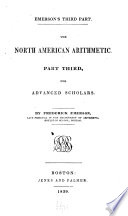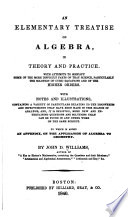 | Frederick Emerson - 1839 - 300 pages
...and 1+7 = 3+5. Also in the series 11, 8, 5, 2, 11+2 = 8 + 5. THEOREM II. In any equidifferent series, the sum of the two extremes is equal to the sum of any two means, that are equally distant from the extremes; and equal to double the middle term, when... | |
 | John D. Williams - 1840 - 634 pages
...And an arithmetical mean between a and b is —£—. 4. In any continued arithmetical progression, the sum of the two extremes is equal to the sum of any two terms that are equally distant from them, or to double the middle term, when the number of... | |
 | Charles Waterhouse - 1842 - 178 pages
...called the common difference. PRINCIPLES ASSUMED. 1. When four numbers form a progressional series, the sum of the two extremes is equal to the sum of the two means ; and of any three quantities, in such a series, double the mean is equal to the sum of the extremes. 2.... | |
 | Charles Waterhouse - 1842 - 180 pages
...such a series, double the mean is equal to the sum of the extremes. 2. In any equidifferent series, the sum of the two extremes is equal to the sum of any two means that are equally distant from the extremes, and equal to double the middle term, when... | |
 | mrs. Henry Ayres - 1843 - 470 pages
...the extremes; and the other terms between them, the means. In any continued Arithmetical Progression, the sum of the two extremes is equal to the sum of any two means equally distant from them, or equal to double the middle term, when the number of terms... | |
 | William Watson (of Beverley.) - 1844 - 200 pages
...7 = 4X2and ガ + ダ = 2 y THEOREM 2 If four numbers or quantities be in arithmetical pro portion, the sum of the two extremes is equal to the sum of the two means・ As 1, 3, 5, 7 and x, y, z, w・ Then 1+7=3 + 5 and x + w = y + z・ F ヰ o 血 thef ㏄ ego 五 gtheo... | |
 | Warren Colburn - 1844 - 280 pages
...4, cd, be four successive terms of a progression by difference. b — a = d — c b + c = a That is, the sum of the two extremes is equal to the sum of the two means. Example. Let 5, 9, 13, 17, be four successive terms. 9 + 13 = 17-4-5=22. Let a, b, c, d, e ..... h,... | |
 | Charles WATERHOUSE - 1844 - 228 pages
...such a series, double the mean is equal to the sum of the extremes. 2. In any equidifferent series, the sum of the two extremes is equal to the sum of any two means that are equally distant from the extremes, and equal to double the middle term, when... | |
 | Charles Davies - 1845 - 382 pages
...two equations, we have a + d = b + c : that is, If four quantities are in arithmetical proportion, the sum of the two extremes is equal to the sum of the two means. I Arithmetical Progression. 161. When the difference between the first antecedent and consequent is... | |
 | 1845 - 196 pages
...last 'terms are called the extremes. Note. — In any series of numbers in Arithmetical Progression, the sum of the two extremes is equal to the sum of any two terms equally distant from them ; as in the latter of the above series 6+1=4+3, and =5+2. When... | |
| |